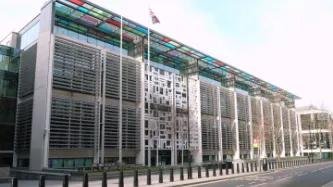Search
Content type: News & Analysis
*Photo by Michelle Ding on Unsplash
Pat Finucane was killed in Belfast in 1989. As he and his family ate Sunday dinner, loyalist paramilitaries broke in and shot Pat, a high profile solicitor, in front of his wife and children.
The Report of the Patrick Finucane Review in 2012 expressed “significant doubt as to whether Patrick Finucane would have been murdered by the UDA [Ulster Defence Association] had it not been for the different strands of involvement by the…
Content type: Long Read
*Photo by Kristina Flour on Unsplash
The British government needs to provide assurances that MI5’s secret policy does not authorise people to commit serious human rights violations or cover up of such crimes
Privacy International, along Reprieve, the Committee on the Administration of Justice, and the Pat Finucane Centre, is challenging the secret policy of MI5 to authorise or enable its so called “agents” (not MI5 officials) to commit crimes here in the UK.
So far we have discovered…
Content type: Examples
A woman was killed by a spear to the chest at her home in Hallandale Beache, Florida, north of Miami, in July. Witness "Alexa" has been called yet another time to give evidence and solve the mystery. The police is hoping that the smart assistance Amazon Echo, known as Alexa, was accidentally activated and recorded key moments of the murder. “It is believed that evidence of crimes, audio recordings capturing the attack on victim Silvia Crespo that occurred in the main bedroom … may be found on…
Content type: Press release
Privacy International, Open Rights Group, the Institute for Strategic Dialogue, Fair Vote, Who Targets Me? and Demos have today written to all the main UK political parties, demanding that they are transparent with the public about how they are using voters’ personal data in their electioneering. Twitter's announcement yesterday of their ban on political advertising is just the latest wake up call to politicians about the risks to democracy of personal data driven microtargeting of political…
Content type: Examples
Bethany Christian Services, an international pregnancy support and adoption agency, is launching a programme with Copley Advertising to send targeted ads to individuals visiting Planned Parenthood clinics, abortion clinics, methadone clinics and high-risk areas (AHPA). The targeting will be done through the use of geo fencing based on smartphones located within the selected locations.
Source: https://www.liveaction.org/news//adoption-agency-send-pro-life-ads-smartphones-inside-abortion-…
Content type: Examples
In 2018, Brian Hofer, the chair of Oakland's Privacy Advisory Commission, filed suit after police wrongfully stopped him at gunpoint because their automated license plate recognition system, supplied by Vigilant Solutions, indicated that the rental car he was driving had been stolen. The car had in fact been stolen some months earlier, but been recovered. Despite such errors, police claim that the technology has helped reduce crime, identify stolen vehicles, and identify and arrest suspects.…
Content type: Examples
In 2018, repossession services in the US were experiencing a boom in business as the number of Americans failing to keep up with their car payments reached its highest point since 2012. One of these, Ohio-based Relentless Recovery, was increasing its hit rate by equipping its agents' vehicles with cameras to help it build a database of every license plate in the state along with the locations where the vehicles may be easily found. Repo agents collect most of the billions of license plate scans…
Content type: Examples
In February 2019, the UK Home Office told the Independent Chief of Borders and Immigration that it was planning to build a system that could check and confirm an individual's immigration status in real time to outside organisation such as employers, landlords, and health and benefits services. Lawyers and human rights campaigners expressed concerns that the project had received no scrutiny or public discussion, and that the Home Office's record suggested the result would be to unfairly lock…
Content type: Examples
In February 2019 BuzzFeed News reported that one of the largest home DNA testing companies, FamilyTreeDNA, had formed an agreement with the FBI to grant the agency access to its database of more than 1 million genetic profiles, most of which were supplied by consumers with no thought that they would be accessible to law enforcement. FamilyTreeDNA has also agreed to test DNA evidence and identify remains of victims of violent crimes for the FBI in its own laboratory. FamilyTreeDNA said…
Content type: Examples
In January 2019 the UK Home Office announced it would collaborate with France to overhaul its regime for suspicious activity reports in order to fight money laundering. In 2018, the number of SARs filed with the National Crime Agency rose by 10% to nearly 464,000. Banks, financial services, lawyers, accountants, and estate agents are all obliged to file SARs if they suspect a person or organisation is involved in money laundering, terrorist finance, or other suspicious activity. The system has…
Content type: Examples
In 2018, the UK Department of Education began collecting data for the schools census, a collection of children's data recorded in the national pupil database and including details such as age, address, and academic achievements. The DfE had collected data on 6 million English children when, in June 2018, opposition led the department to halt the project, which critics said was an attempt to turn schools into internal border checkpoints. In January 2019, however, in an answer to a Parliamentary…
Content type: Examples
The US Department of Homeland Security awarded a $113 million contract to General Dynamics to carry out the Visa Lifecycle Vetting Initiative (VLVI), a renamed version of the Extreme Vetting Initiative and part of a larger effort called the National Vetting Enterprise. In May 2018, public outrage led the DHS to back away from a machine learning system that would monitor immigrants continuously; however, the reason it gave was that the technology to automate vetting did not yet exist. These…
Content type: Examples
New workplace technologies are generating mountains of data on workers despite a lack of clarity over how the data is used and who owns it. In offices, smart badges track interactions and sensors track fitness and health; in trucks sensors monitor drivers' performance in the name of safety. In the US state of Illinois, between July and October 2017 26 lawsuits were filed by employees alleging that their employers had violated the state's Biometric Information Privacy Act, which requires a…
Content type: Examples
After four years of negotiation, in 2017 Google began paying Mastercard millions of dollars for access to the latter's piles of transaction data as part of its "Stores Sales Measurement" service. Google, which claimed to have access to 70% of US credit and debit cards through partners, said that double-blind encryption prevents both partners from seeing the other's users' personally identifiable information. Mastercard said the company shares transaction trends with merchants and their service…
Content type: Examples
In September 2018, at least five local English councils had developed or implemented a predictive analytics system incorporating the data of at least 377,000 people with the intention of preventing child abuse. Advocates of these systems argue that they help councils struggling under budget cuts to better target their limited resources. The Hackney and Thurrock councils contracted the private company Xantura to develop a predictive model for them; Newham and Bristol have developed their own…
Content type: Examples
In October 2018, the answers to a FOIA request filed by the Project on Government Oversight revealed that in June 2018 Amazon pitched its Rekognition facial recognition system to US Immigration and Customs Enforcement officials as a way to help them target or identify immigrants. Amazon has also marketed Rekognition to police departments, and it is used by officers in Oregon and Florida even though tests have raised questions about its accuracy. Hundreds of Amazon workers protested by writing a…
Content type: Examples
In October 2018, in response to questions from a committee of MPs, the UK-based Student Loans Company defended its practice of using "public" sources such as Facebook posts and other social media activity as part of the process of approving loans. In one case earlier in the year, a student was told that a parent's £70 Christmas present meant the student did not qualify for a maintenance loan without means testing because it meant the student was not estranged from their family. SLC insisted…
Content type: Examples
In November 2018, 112 civil liberties, immigrant rights groups, child welfare advocates, and privacy activists wrote a letter to the heads of the US Department of Health and Human Services and the Department of Homeland Security demanding an immediate halt to the HHS Office for Refugee Resettlement's practice of using information given them by detained migrant children to arrest and deport their US-based relatives and other sponsors. The policy began in April 2018, and the result has been that…
Content type: Examples
In November 2018 the UK's Equality and Human Rights Commission warned that asylum seekers have been deterred from seeking medical help in Scotland and Wales since the UK government began forcing the English NHS to charge upfront in 2017 and by fears that medical personnel will comply with Home Office orders to forward their data. The commission, along with health charities and the Labour and LibDem political parties, called for the policy to be suspended. The Home Office policy of moving asylum…
Content type: Examples
The Home Office Christmas 2018 announcement of the post-Brexit registration scheme for EU citizens resident in the UK included the note that the data applicants supplied might be shared with other public and private organisations "in the UK and overseas". Basing the refusal on Section 31 of the Freedom of Information Act, the Home Office refused to answer The3Million's FOI request for the identity of those organisations. A clause in the Data Protection Act 2018 exempts the Home Office from…
Content type: Examples
In December 2018, a report, "Access to Cash", written by the former financial ombusdsman Natalie Ceeney and independent from but paid for by the cash machine network operator Link, warned that the UK was at risk of sleepwalking into a cashless society and needed to protect an estimated 8 million people (17% of the British population) who would become disadvantaged as a result. Although cash used halved between 2007 and 2017, and debit cards passed cash in share of retail transactions in 2017,…
Content type: Examples
In October 2018, British home secretary Sajid Javid apologised to more than 400 migrants, who included Gurkha soldiers and Afghans who had worked for the British armed forces, who were forced to provide DNA samples when applying to live and work in the UK. DNA samples are sometimes provided by applicants to prove their relationship to someone already in the UK, but are not supposed to be mandatory. An internal review indicated that more people than the initially estimated 449 had received DNA…
Content type: Examples
In December 2018, Florida citizen Peter Sean Brown filed a federal lawsuit against the Monroe County Sheriff's offices for arresting and detaining him for three weeks claiming he was an illegal alien from Jamaica. Even though Brown offered to show the sheriff his birth certificate and explained he had been wrongfully detained 20 years before and the jail's own records listed his birthplace as Philadelphia, PA, the sheriff relied on a form sent by Immigration and Customs Enforcement. Brown…
Content type: Examples
In a report released in December 2018, the UK's National Audit Office examined the management of information and immigrant casework at the Home Office that led to the refusal of services, detention, and removal of Commonwealth citizens who came to the UK and were granted indefinite leave to remain between 1948 and 1973, the so-called "Windrush generation" but never given documentation to prove their status. The NAO concludes that the Home Office failed to adequately consider its duty of care in…
Content type: Examples
In November 2018, worried American parents wishing to check out prospective babysitters and dissatisfied with criminal background checks began paying $24.99 for a scan from the online service Predictim, which claimed to use "advanced artificial intelligence" to offer an automated risk rating. Predictim based its scores in part on Facebook, Twitter, and Instagram posts - applicants were required to share broad access to their accounts - and offered no explanation of how it reached its risk…
Content type: Examples
In November 2018, researchers at Sweden's University of Lund, the US's Worcester Polytechnic Institute, and the UK's Oxford University announced that in August the US State Department had begun using a software program they had designed that uses AI to find the best match for a refugee's needs, including access to jobs, medical facilities, schools, and nearby migrants who speak the same language. Known as "Annie MOORE", refugees matched by the program were finding jobs within 90 days about a…
Content type: Examples
In November 2016 the UK Information Commissioner's Office issued an enforcement notice against London's Metropolitan Police, finding that there had been multiple and serious breaches of data protection law in the organisation's use of the Gangs Violence Matrix, which it had operated since 2012. The ICO documented failures of oversight and coherent guidance, and an absence of basic data protection practices such as encryption and agreements covering data sharing. Individuals whose details are…
Content type: News & Analysis
Privacy International has joined over 30 organisations working with migrants and refugees to write to the newly appointed British Home Secretary to raise a number of pressing issues, which require action if the immigration and asylum system is to regain the trust of the public.
The letter below was sent to the Home Secretary on Wednesday, 30 July 2019.
Find out more about PI’s work to demand a more humane approach to immigration based on the principles of fairness, accessibility, and respect…
Content type: News & Analysis
Picture Credit: US AID
US President Trump has been cutting aid to Central America, including a surprise cut of approximately $500m in aid to the “Northern Triangle” countries of El Salvador, Guatemala, and Honduras, apparently as punishment for “doing absolutely nothing” to prevent emigration to the US.
What remains of the funds is largely and deliberately being repurposed for spending on the US’s own security interests: indeed, one area which his…
Content type: News & Analysis
Foto: US AID
El presidente estadounidense Trump ha estado recortando la ayuda a Centroamérica, incluyendo un recorte sorpresivo de aproximadamente 500 millones de dólares a los países del “Triángulo del Norte” (El Salvador, Guatemala y Honduras), al parecer como castigo por “no haber hecho absolutamente nada” para impedir la emigración hacia los Estados Unidos.
Los fondos restantes están siendo reorientados,en su gran mayoría y deliberadamente, al gasto para…







